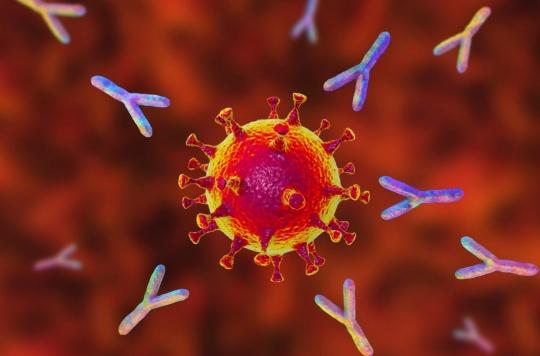This monoclonal antibody is effective against all forms of the virus, including the Delta variant.

- Antibodies are proteins made by the immune system to recognize and signal infectious agents.
- Monoclonal antibodies are those made to fight a specific disease.
- They can be injected prophylactically, that is to say for a preventive purpose.
There is a new weapon to fight against Covid-19. Swiss researchers have developed an antibody capable of acting against all forms of the virus, including its variants. This work was carried out by scientists from the Ecole Polytechnique Fédérale de Lausanne and the Center Hospitalier Universitaire Vaudois. They appeared in Cell Reports.
The most powerful antibody ever identified
To develop this new shield against Covid-19, the researchers first isolated lymphocytes, that is to say immune cells, from an infected patient. According to them, the antibody discovered is the most powerful ever identified among all the antibodies capable of acting against the coronavirus. It attacks a part of the Spike protein, which is not subject to mutations, but this allows SARS-CoV-2 to enter our cells. The antibody blocks interactions between this protein and ACE2 receptors, one of the virus’ targets. This action has two effects: viral replication is interrupted and the immune system eliminates the infectious agent from the body. “This protective effect was demonstrated in vivo, when antibody-treated hamsters were protected from infection after being exposed to a highly infectious dose of virus.“, explain the authors in a communicated.
A prolonged action, beneficial to fragile people
The researchers then modified it to have a prolonged action: “A classic unmodified antibody will have protective effects for 3 to 4 weeks maximum, they point out. Here, the developed antibody will act for 4 to 6 months.” For scientists, it could be useful in vulnerable people, unable to produce an immune response, despite vaccination, such as immunocompromised people, those who have received an organ transplant or those with cancer. All of these people could be protected”thanks to an injection of the antibody two to three times a year“. The researchers nevertheless point out that these injections are not intended to replace vaccination, which remains “the most effective way to protect against infection“.
Upcoming clinical trials
“The CHUV and the EPFL – within the framework of collaboration and intellectual property agreements – are in discussion with a start-up whose mission will be to ensure the production and clinical development of the newly discovered antibodies.“, indicate the authors in their press release. The scientists hope to be able to start clinical trials as early as the end of 2022. If they validate these results again, this new monoclonal antibody could be part of the new tools to fight against the virus.

.















